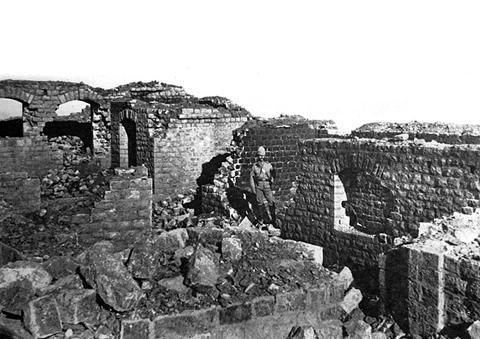


The Last Stand of the 21 Sikhs —- The Battle of Saragarhi
Everyone knows the story of the 300 Spartan’s, where a small force of Spartan warriors (and allies) stand against a massive Persian Army at the narrows of Thermopylae. Less famous than the Spartans, though every bit as equally badass were the 21 Sikhs of Saragarhi whose last stand is still legendary among Sikhs today.
In 1897 the 36th Sikh Regiment of the Indian Army was tasked with guarding the border district of Kohat along the border between Afghanistan and Pakistan. At the time India and Pakistan was part of the British Empire, and due to earlier British invasions of Afghanistan Pashtun and Afridi tribes threatened India (Pakistan) with raids and invasion. Near the border situated between two forts was a small communications outpost manned by 21 Sikh soldiers of the 36th Sikh Regiment under the command of Havildar (post sergeant) Ishar Singh.
On the morning of Sept. 12th Signalman Gurmurkh Singh looked out onto the horizon to find it blotted with hundreds of Afghan battle standards. Altogether a force of 10,000-20,000 Afghan tribesmen, armed with several heavy artillery pieces were slowly marching toward the outpost. Havildar Singh gathered his men together to decide what to do. He put the matter to a vote, they could retreat and fall back or defend their outpost. Without hesitation all 21 men agreed that they would not retreat, but rather hold their ground in order to give the other two forts time to prepare for the Afghan assault.
At. 9:00 AM the Afghans began bombardment of the outpost. After a fierce shelling the Afghan army attempted twice to storm the small post with ladders, and each time they were held back by a fierce Sikh defense. By the fifth hour of the fighting Afghan forces had managed to breech the walls with their artillery, and had burned down the main gate to the garrison. As Afghan warriors charged into the main courtyard Havildar Singh ordered his men to fall back into the inner keep and create new defensive positions. To cover his men, Havildar Singh drew a dagger and a pistol, and charged headlong into the Afghans, buying enough time for his men to fortify their new positions.
By the 7th hour of the battle the Sikhs had run out of ammo and fixed bayonets for hand to hand combat. An hour later the Sikhs had been killed to the man, and Signalman Gurmurkh Singh communicated that the outpost had fallen. The last holdout of the Sikh force, Gurmurkh was reported to have yelled repeatedly the Sikh battle cry “Bole So Nihal, Sat Sri Akal” (Victory belongs to those who recite the name of God with a true heart), before he personally slayed 20 Afghans.
After the Afghans had taken the outpost at Saragarhi, they quickly moved on to capture the two other forts. However the 21 Sikh’s sacrifice had bought enough time for Indian and British reinforcements to be marshaled. The Afghan force was quickly routed and chased back to Afghanistan. At Saragarhi the corpses of 21 Sikh soldiers and 800 Afghans surrounded a torn and battered outpost. Upon inspection it was found that the Sikhs had fired all of their ammo, about 400 rounds per person. All of the 21 Sikhs posthumously received the Indian Order of Merit.
The 21 Sikhs are listed as follows;
- Havildar Ishar Singh
- Naik Lal Singh
- Sepoy Narayan Singh
- Lance Naik Chanda Singh
- Sepoy Gurmukh Singh
- Sepoy Sundar Singh
- Sepoy Jivan Singh
- Sepoy Ram Singh
- Sepoy Gurmukh Singh
- Sepoy Uttar Singh
- Sepoy Ram Singh
- Sepoy Sahib Singh
- Sepoy Bhagwan Singh
- Sepoy Hira Singh
- Sepoy Bhagwan Singh
- Sepoy Daya Singh
- Sepoy Buta Singh
- Sepoy Jivan Singh
- Sepoy Jivan Singh
- Sepoy Bhola Singh
- Sepoy Nand Singh
(via gxdmxtherwxlf)
Notes
thegayaxeman liked this
msch4n4ndl3rb0ng liked this
 gouachevalier reblogged this from peashooter85
gouachevalier reblogged this from peashooter85 highlanddrums liked this
 borncountry reblogged this from havingfun09
borncountry reblogged this from havingfun09 havingfun09 liked this
im-a-colourless-sunshine reblogged this from peashooter85
 wastehound-voof liked this
wastehound-voof liked this henrir6 liked this
sizzlingkingmilkshake liked this
 hzj75 liked this
hzj75 liked this yourgodsarentreal liked this
yourgodsarentreal reblogged this from northirish
ghostlight01 reblogged this from northirish
ghostlight01 liked this
tipsygoblin reblogged this from northirish
gracebriarwoodwrites liked this
 budman1948 liked this
budman1948 liked this  northirish reblogged this from peashooter85
northirish reblogged this from peashooter85 dangercupcakemurdericing liked this
aaelfohto reblogged this from chocolate--goddess
 chocolate--goddess reblogged this from dab-daddy
chocolate--goddess reblogged this from dab-daddy dab-daddy reblogged this from optimisticallyapocalyptic
optimisticallyapocalyptic reblogged this from peashooter85
theren liked this
 littletownlibrarian reblogged this from peashooter85
littletownlibrarian reblogged this from peashooter85  hg807 liked this
hg807 liked this  climb4you liked this
climb4you liked this  korolk-blog liked this
korolk-blog liked this  6theagony6ofmyheart6 liked this
6theagony6ofmyheart6 liked this  red88smitty liked this
red88smitty liked this  sub-nightshade liked this
sub-nightshade liked this ekdromoi liked this
 1texn liked this
1texn liked this  m60bluelove reblogged this from peashooter85
m60bluelove reblogged this from peashooter85  m60bluelove liked this
m60bluelove liked this  bi-catastrophe liked this
bi-catastrophe liked this bachatanero liked this
peashooter85 posted this
- Show more notes